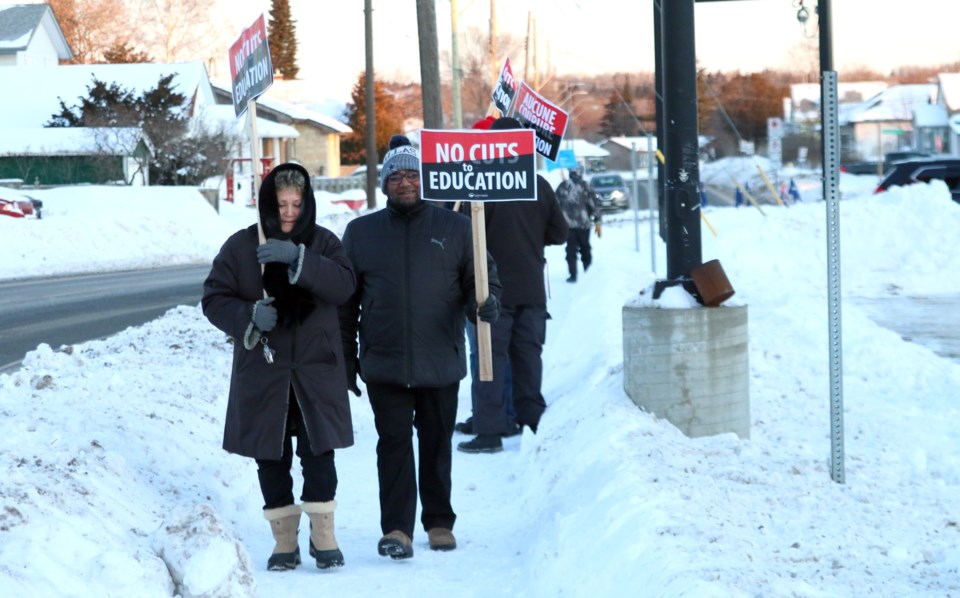THUNDER BAY - As teachers took to the picket line for a one day strike along the north shore, educators here in Thunder Bay held information pickets to continue to spread the word that cuts to public education are hurting Ontario children.
“If we are not on a full strike, our members are expected to be on an information picket like this or handing out information flyers in the community,” said Rich Seeley, president of the Ontario Secondary Teachers Federation District 6A Thunder Bay.
“As long as we can get the word out to the public, which is our main goal, to explain our side of the conflict. We think it’s working so far. Is it having an effect on the government, not so much yet.”
Ontario Secondary School Teachers Federation members and the provincial government have been at odds for several months as bargaining continues to breakdown between the two sides on a new contract.
On Wednesday, teachers and support workers with the Superior-Greenstone District School Board, along with several other boards across the province, held a one-day walkout, similar to the one held in Thunder Bay on Dec. 18.
In an act of solidarity, teachers with the Lakehead Public School Board held an information picket outside several local high schools.
“This is about the quality of education in schools,” Seeley said. “That is what we are about, that is what our members care most about. I think that message is resonating with the public. Hopefully the government will hear it at some point and actually care.”
Seeley added the government was offered the chance to return to the bargaining table if average class sizes are returned to 22 students rather than the government’s proposed 28.
“They said no, which tells you they have no interest in supporting public education in Ontario,” Seeley said. “They’ve not given one individual reason why increasing class sizes averages to 28 is a good thing for education. It’s completely a money saving situation. It’s meant, we believe, to bankrupt the system, destroy it, so they can bring in a private education system to get profits in the hands of their friends pockets.”
According to Seeley, before the previous contract even expired last year, average class sizes were raised from 22 to 28.
“Since then they are willing to come down to 25, which is still a significant increase in the number of average students per class, which will decrease the numbers of teachers in schools, decrease the number of options kids will be able to take,” he said.
For Alan Koivu, who teaches math and science at Superior Collegiate and Vocational Institute, disagreements with the provincial government is something he has experienced before in his 27 years of teaching.
“It’s just a cycle,” he said. “Whether it’s the Harris government in 98, every several years we are back at this and elected politicians with no knowledge of education are the ones that are making all the decisions. It’s very frustrating.”
Koivu added he feels the public is supporting teachers across the province.
“People are recognizing that we are supporting public education,” he said. “I don’t think the government is listening and the two parties are not talking right now, which is frustrating.”
Seeley added that public polling has found that between 60 and 70 per cent of parents support the OSSTF actions.
While no schools in Thunder Bay were closed on Wednesday, the situation remains fluid, Seeley said, and if no bargaining takes place and no agreement is reached, more job action will be taken.
“We’ve been on a rotating situation,” he said. “If there is a pattern, it is likely we will be out again on a full walk out at some point this month. But it’s a week by week situation and things can change in the blink of an eye.”
“We can’t go on like this,” Koivu added. “We’ve had full day strikes once every two or three weeks. Something has to happen. We have to settle eventually.”
